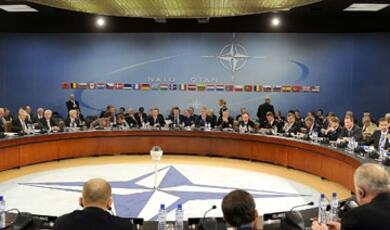The rhetoric of enmity
Share
- Details
- Transcript
- Audio
- Downloads
- Extra Reading
"You may tell a lady by the company she keeps." But you may tell political leaders by the company they shun. Their descriptions of enemies are a way of telling stories about themselves. The use of accounts of enemies from the Reformation to the 'war on terror'.
Download Transcript
THE RHETORIC OF ENMITY
Professor Rodney Barker
'You may tell a lady by the company she keeps'. But you may tell political leaders by the company they shun. Their descriptions of enemies are a way of telling stories about themselves. The use of accounts of enemies from the Reformation to the 'war on terror'.
*1 PICTURE
Stories are not always what they seem:
In the Gospel according to St Luke, there is an account of the man who, praying in the temple, declares 'God, I thank thee, that I am not as other men are, extortioners, unjust, adulterers, or even as this publican'
Who is he talking about? None of the characteristics listed are ascribed to the speaker. Yet it is about the speaker that the story is really being told. The purpose of the 'other men' and of 'even this publican' is not to be people or identities in their own right or for themselves, but to be the spaces which define the substance of the speaker.
Enemies are described to tell us who, by contrast, we are.
This can be observed in all walks of life, and no more so than in politics. You may tell a lady by the company she keeps. But you may tell political leaders by the company they shun. They give descriptions of their enemies as a way of publishing messages about themselves.
Who politicians won't shake hands with is a much more important statement than whom they will
*2 PICTURE
Two accounts of enemies Bush and Osama.
In January 2002 President George Bush of the United States spoke of an 'an axis of evil, arming to threaten the peace of the world' against which his country and its allies must struggle.
'Every nation, in every region, now has a decision to make. Either you are with us, or you are with the terrorists.'
Osama bin Laden, four years earlier said that the struggle of all good Muslims wasagainst 'the tyrants and the aggressors and the enemies of Allah'.
'The truth is that the whole Muslim world is the victim of international terrorism, engineered by America at the United Nations. We are a nation whose sacred symbols have been looted and whose wealth and resources have been plundered.'
Five features of these quotes:
1. Negativity How few claims they make about themselves, concentrating on the negative qualities of the described enemy.
2. Similarity/Mirror How similar they are
3. Exaggeration
4. 'They hate our way of life'
Each portrayed the other as a threat to a way of life, so that the account of the enemy was in total terms, of an alien civilisation, and at the same time one which was characterised principally by its aggressiveness. So on the one hand one's own identity is cultivated by default or displacement, on the other the identity of the enemy is narrated principally, though not exclusively, in terms not of how it lives its own life, but how it threatens yours.
Existential threat: each tells a story about terrorism, about an enemy who threatens not just physical safety but its way of life, each accuses the other of aggression, of being evil or an enemy of true religion
5. The recurring supernatural, metaphysical, or religious tone. The difference between 'us' and 'them' will frequently be raised to the most absolute level by presenting 'them' not just as dangerous or harmful, but 'evil'. Those who thought we were entering a secular, practical, century, should bear this in mind
The advantage of this is that if an enemy can be described, against whom you are fighting or whom you are resisting, then there is less need or no need to list your own particular virtues: you are fighting evil, and that is sufficient. It lets you off a lot of hooks.
There are two sides to the stories we tell about our enemies: on the one hand, they create an image of something which is the opposite of how we see ourselves; on the other, they create, either implicitly or explicitly, a favourable account of 'us', whoever 'we' are, which is all the more positive because of the contrast.
Hostility and enemies in the Twenty First Century
It seems as if we enter the twenty first century with a politics which is characterised by hostility, and where people can far more readily say what they are against than they can say what they are for:
'He was agin it'
The war on terror
The war on materialist enemies of Allah
The war on imperialism
But is this new?
The twentieth century was just as much polarised between enemies: On each occasion, whatever the objective threat, there were always exaggerations or downright forgeries.
This illustrates the way in which stories about enemies can operate. They are helped, but do not depend on, some nugget of truth. But they are constructed out of, and at the same time construct, the fears and hopes, the aspirations and aversions of those who tell them and of those who hear them.
People are inclined to believe stories which extend what they already believe, or which confirm their existing loyalties and hostilities:
Sarah Nelson's story about the house smashing in Belfast
War on Terror preceded by the Cold War, capitalism and communism
the communist east versus the capitalist west.:
Iron Curtain divides us
When Winston Churchill made the speech in Fulton Missouri in 1946 which launched the phrase, he spoke of a Communism orchestrated from Moscow which constituted 'a growing challenge and peril to Christian civilization.'
War against dictators
The historian Siân Nicholas comments on British Second World War propaganda that
'the ways in which the British defined others had a strong connection to how they represented themselves. The Germans were tyrannous, mechanical, brutal and aggressive to the point of frenzy; the British were freedom loving, improvisatory, tolerant and pacific until roused to righteous anger. The Russians were backward but valiant, the British were encouraging and supportive. America was young and excitable, Britain was mature and reflective.'
Nazism and Communism: The war against revolution, or against reaction.
*4PICTURE If you were a Nazi, the war against communism, eastern hordes, and the enemies of civilisation,
*5PICTURE
*6 PICTURE If you were a communist, the war against capitalism, religion, and old authority
*7 PICTURE If you were a capitalist and/or a democrat, then Bolshevism was the enemy, and if you were a North American, then European revolutionary ideas were the threat (1919)
*8 PICTURE
The flexibility of enemies! Like dolls with many clothes
In all of this, the features of exaggeration, forgery, and simple polarisation occur again and again
The Zinoviev letter of 1924
illustrates the permeable boundaries between truth and fiction, conviction and deception, real enemies and imaginary ones:
In 1924 the first ever Labour Government under the premiership of James Ramsay MacDonald enjoyed a brief, minority spell of government. It depended on Liberal support since, though it was the second largest party, it lacked an overall majority.
By the autumn the support for the minority government had collapsed with a vote of confidence over the decision of the Attorney General to withdraw a prosecution of the editor of The Workers' Weekly for an article which appeared to encourage members of the armed forces not to obey orders if called in to police industrial disputes, and an election was called for October. Four days before the poll the Daily Mail, under the headline 'Civil War Plot by Socialists' published what purported to be a letter from Grigori Zinoview, the Russian head of the Communist International, to the Communist Party in Britain, calling on them to work for the conclusion of the ongoing Anglo-Russian trade agreement, and to work for the furtherance of Leninist ideas, the setting up of Communist cells in the armed forces and the munitions industry, all of which would further the cause of revolutionary uprising in Britain and lay the foundations for a British red army. The article was given plausibility by the (correct) report that the Foreign Office and the Prime Minister had already seen the letter, and were preparing an official protest to the Soviet Union.
Labour lost 40 seats in the election, and the Conservatives returned to power with an overall majority
Several things are clear in an otherwise murky and uncertain story:
1. The letter was forgery
2. Zinoviev existed
3. Communism was a revolutionary doctrine which envisaged the replacement, if necessary by violent revolution, of capitalism with socialism leading to an eventual classless communist society
4. The letter was presented to the Foreign Office by MI6 as one whose source they knew and could authenticate, when this was not the case
5. The letter was leaked to the Conservative Party and the Daily Mail by someone in MI6: there are various suspects but no clear guilty party
Beyond that very little is certain
So what was going on? The most likely interpretation is that individuals in MI6 knew the letter was a forgery, may have forged it themselves, but believed so strongly that not only Russian Communism, but English socialism, were threats to 'their way of life' or 'the way of life we value' that either it might have been an accurate account, though forged, and that even it wasn't, it was a wicked means to a good end: warning the nation against dangerous doctrines, and embarrassing the Labour government and possibly contributing to its defeat at the polls. The intelligence, in other words, was shaped around the policy.
Nor was there much difference before the Russian Revolution of 1917 which set the pattern for the next 70 odd years
England & Germany before 1914
England hated and feared Germany, whilst in Germany nationalist rhetoric berated the English enemy. Again, the stress on the wickedness and depravity of the enemy is at least as great as any account of one's own virtues
'I have before me a file of amazing documents, which plainly show the feverish activity with which this advance guard of our enemy is working to secure for their employers the most detailed information. These documents have already been placed before the Minister of War, who returned them without comment!' plus change! William Le Queux, Preface to 'Spies of the Kaiser' (1909)
the sociologist Werner Sombart, writing in 1914: 'it seems to me that the spontaneous and elementary hatred against England is anchored in the deepest core of our being, there where "rational considerations" no longer exist, where the "irrational", the instinctive, has sole jurisdiction. We hate in the English a principle which is alien to our innermost and highest being. And it is proper that we should become fully conscious of this, because in so doing we also reveal the ultimate purpose of the struggle which we are now waging.'
*8 PICTURE Bony
At the beginning of the previous century, hostility to Napoleon and the ambitions of the French
In the eighteenth century, hostility to France as both a hostile power and the home of a hostile religion
The flexibility of these stories is illustrated by the ease with which an account of the menace posed by the French monarchy was replaced by adulation for that monarchy when it was seen as the alternative to the even greater threat of revolution. Burke and the bird, the defence of Marie Antoinette
In the previous century, it had been, for England, Catholic Europe, though the enemies were very flexible
Seventeenth century & Holland
Changing account of the Netherlands, illustrating the flexibility of enmity:
In the first war (1652-4), the Dutch were seen as not reliably Protestant, and over-friendly to the House of Orange and hence to monarchy, in the second (1665-7) and third (1672-4) as republican and hostile to monarchy.
In the sixteenth century, the language and imagery of religious enmity was of wickedness and menace
I could go back further, to Christendom challenged by the barbarous east, or by the Ottoman Turk,
to Greece challenged by the empire of Persia,
to Adam and Eve and the serpent (critics who say that Satan is far more interesting than Adam and Eve in Milton)
So where we now find ourselves is nothing new. The 'war on terror' and the war on the west.
But will the new millennium be different?
When in 1989 the Cold War came to an end, there were those, like Francis Fukuyama, who envisaged an end of history. Hostility and confrontation would be replaced by democracy and markets, by conversation and trading.
But it soon became apparent that there was one thing worse than being all alone without a friend in the world, and that was being all alone without an enemy in the world. Fukuyama's first flight of the idea was in 1989, his book was in 1992, and the following year his fellow American Samuel Huntington was predicting that the Cold War would now be succeeded by a clash of civilisations.
The search was on for new enemies, or rather for new stories to tell about the enemies whose depicted threat diverted effort away from too much need to say who we were, as contrasted with who we were against was on.
'A man cannot be too careful in his choice of enemies.'
But does that mean that there will always be more readiness to say what we are against than to say what we are for, that a world with no stories of wicked opponents is too difficult and uncertain? That is what I shall examine next time
©Professor Rodney Barker, Gresham College, 1 October 2007
This event was on Mon, 01 Oct 2007
Support Gresham
Gresham College has offered an outstanding education to the public free of charge for over 400 years. Today, Gresham plays an important role in fostering a love of learning and a greater understanding of ourselves and the world around us. Your donation will help to widen our reach and to broaden our audience, allowing more people to benefit from a high-quality education from some of the brightest minds.


 Login
Login







